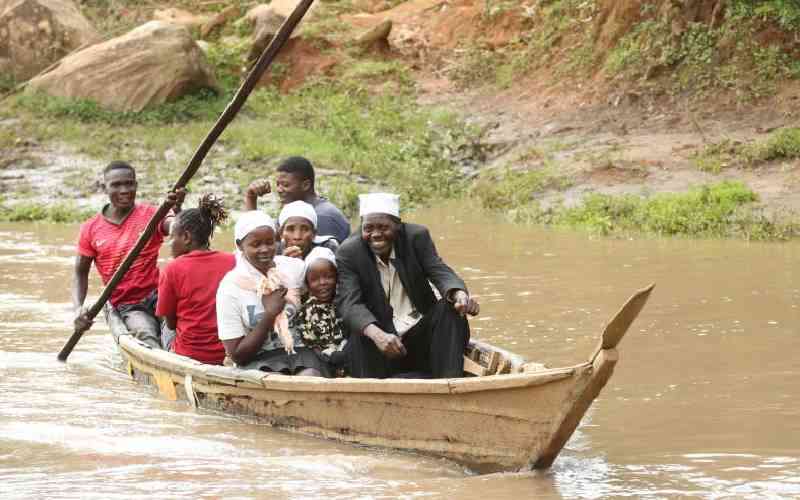
The deep, twenty-foot wide river Isiukhu separates Shitaho and Mundulu villages in Kakamega County.
There are no footbridge linkages between the two villages thus, anyone seeking to cross from Shitaho to Mundulu and vice versa must do so using a canoe that has seen better days.
Outgoing Shinyalu Constituency Member of Parliament Justus Kizito says he had mooted plans to build a footbridge over the river using CDF money but, "Now that I am no longer in office, the new MP should see to that," he says.
However, a recent court ruling that said CDF is unconstitutional could complicate matters for new MP Fred Ikana, who will be forced to look for funds to build the bridge elsewhere.
At night, or when the canoe owner is unavailable, one must travel about 20 kilometers over land through Khayega or 15 kilometers through Shinyalu to get to the other side of the river crossing.
The alternative is to swim across the river. That is the challenge that villagers in Shitaho and Mundulu are presented with on a daily basis.
Learn the trade
We found 22-year-old Emmanuel Mbalasi reclining on a bench on one end of a canoe that swayed gently, disturbed by ripples created by the fast-flowing water.
He uses the canoe to take people across the River Isiukhu which originates from Cherangani hills and flows into the River Yala on its way to Lake Victoria.
When The Standard team arrived at the river crossing, the water level had retreated by at least one metre. Wetness on the lower bank marked the place where the water had been only a few hours earlier.
"In the wee hours of the morning, the river extends for about one metre beyond the bank but retreats by the time the sun is up," Mbalasi explains.
He started taking people across the river at the age of 10 years.
As a child, his father, Earnest Muhati, allowed him to learn the trade and occasionally, let him steer the craft.
"I schooled at Shivakala Primary before going to Shidodo Secondary school but dropped out in Form Two due to lack of school fees. Since then, I have been making a living ferrying people across the river," he says.
He goes on to explain that the canoe business was started by his father in 2000 after noting that the river not only cut off children from attending school in either village, it limited activities between the villages and easy access to Kakamega town from Mundulu village.
"This section of the river is about 20- feet deep, which rules out walking across. The only option is to use the canoe at a fee of Sh10 or go all the way to Khayega to get to the other village. That is more expensive and time-wasting," Mbalasi says smugly.
He adds that school children aged 12 years and below are ferried across the river free of charge.
Some of the regular users of the canoe, Lucas Amwayi and Brian Maina, say the canoe saves residents time and money because the alternatives are the more expensive circuitous Khayega/Shinyalu routes, and it is very reliable.
"I have been crossing at this point for many years and can confirm it is very safe and convenient. There has never been any incident of it capsizing," Amwayi says.
"I start operating at 5 am and call it a day at 7.30 pm before it is too dark to see. Beyond that time, services are offered by special arrangements. On a good day, Muhati says he makes between Sh1200 and Sh1500. His canoe has the capacity to carry nine people.
"However, whenever there is a funeral or burial in either of the neighbouring villages, there is a lot of movement and I make up to Sh5000 in a day. Most of these people are relatives separated by the river".
The rewarding work, nonetheless, has its bad moments.
"On three separate occasions, I watched as dead bodies floated down the river at an arm's length from my canoe. Witnessing such brings bad luck and each time something like that happens, we must immediately get traditional medicine men to administer herbs to ward off evil spirits. My father says he has lost count of the bodies he has witnessed flash past this point in his years of work. It is forbidden to try to recover such bodies".
"That is part of our occupational hazards," says Pastor Phineas Alusiola of the Repentance and Holiness Church, Mundulu.
In his spare time, Alusiola assists in ferrying people across the river. "I have done this work for five years. I once was shocked to find a dead body trapped on a rock not more than one metre from where I had spent hours ferrying people across the river".
Mbalasi says another challenge is that he does not have a canopy on the canoe. "When it is raining, I have no choice but to work in the rain. Again, once in a while, you take someone across and he refuses to pay, especially the drunkards".
It requires knowledge to qualify to operate the canoe, Mbalasi says.
One of the requirements is that the operator must know how to swim and have the ability to study the flow, speed and level of water to understand how to steer the craft.
"If you start rowing across anyhow, the strong current is likely to sweep you downstream," Mbalasi warns.
Brain Ombima, one of the canoe operators, is a Form Three student at the nearby Shieywe Secondary school. "I love the job because it pays my school fees and takes care of other needs. After school, though, I wish to become a doctor," he says.
 The Standard Group Plc is a multi-media organization with investments in media platforms spanning newspaper print
operations, television, radio broadcasting, digital and online services. The Standard Group is recognized as a
leading multi-media house in Kenya with a key influence in matters of national and international interest.
The Standard Group Plc is a multi-media organization with investments in media platforms spanning newspaper print
operations, television, radio broadcasting, digital and online services. The Standard Group is recognized as a
leading multi-media house in Kenya with a key influence in matters of national and international interest.

